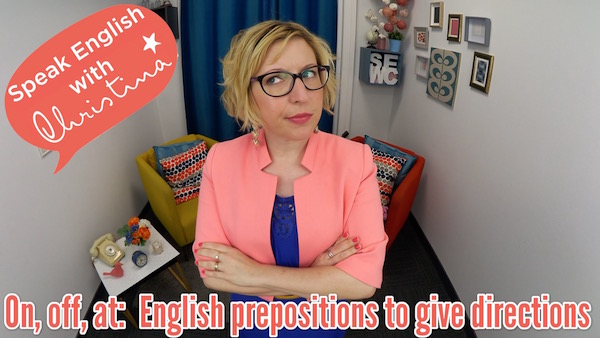
“I understand English but I block when I speak it.” That’s what so many clients tell me, and it’s what happens when you read a lot of English on the internet, listen to tons of podcasts, and binge watch TV shows like Breaking Bad.
All of those are great activities – but when you’re in front of an actual client, you hesitate to find words.
You can’t just quote some memorable line from your favorite series… You need to be able to be spontaneous, to listen, understand, and react appropriately.
It takes practice and confidence, but it is possible!
Let’s look at 4 essential ways you can confidently manage conversations in English.
Index:
1. Positive thinking: Good, but not always enough
2. Solution #1: Get the reflexes for the basics, for confidence from the start
3. Solution #2: Prepare your “counterattacks”
4. Solution #3: Be prepared for the times you lack a word (because it will happen)
5. Solution #4: Learn to accept some discomfort
1. Positive thinking: Good, but not always enough
I often tell clients to keep a positive mindset, to laugh at your silly mistakes, and to not worry about them. That can help a lot, especially in low-stakes conversations, like with friends, close coworkers, or when you’re practicing in the Faster Fluency Conversation Club.
But there are also important, high-stakes situations where you need to do better, and your credibility is connected to your speaking ability.
Maybe it’s a big meeting with your company superiors, a sales pitch to a new client, or a networking conversation with someone you know will help you build your career.
In these cases, yes, it’s important to keep a positive, open mind, but the stress of the situation can interfere with your conversation skills.
It’s normal. This happens even in your native language. Just think how stressed you feel, perhaps, before an important job interview!
In addition to keeping that positive mindset, you also need to do the work in advance: to prepare for the situations, and to practice, practice, practice.
Solution #1: Develop reflexes for the basics, for confidence from the start
You need to build up your reflexes. Even if you know all about Entrepreneur Vocabulary, or if you learned the theory about explaining to a client their idea is bad, you will still need to be able to actually apply what you learned.
Even if you have no one to practice real conversations with, you need to practice the conversations that you know you will have, so you develop those reflexes. (And if you want someone to practice with, I have the perfect solution for you!)
Talk to yourself, your cat, your fridge… It doesn’t matter, but you need to get the habit of easily greeting others, like:
- “Hey, what’s up?”
- “Hey, how’s it going today?”
- “Nice to meet you!”
- “Good to see you again, how have you been?”
These phrases should roll off your tongue, without thinking.
Here’s a tip: Every time you pass your cat or dog, or your favorite chair in your living room, greet it as if it were a person that you’re meeting.
The idea is to repeat the phrases as often as possible, to associate them with greeting someone, so that it becomes a reflex! This is how you build a habit that sticks, so you don’t even have to think about it.
You also want to prepare how to introduce yourself in an interesting and conversational way, and then to engage the conversation in a relaxed way.
There are examples of what to do and what NOT to do in the episode above!
Solution #2: Prepare your counterattacks
By “counterattacks”, I mean prepare questions that you’re comfortable using in several different situations.
You’ll be able to move the conversation forward, avoid awkward silences, and direct the conversation onto topics that you feel comfortable talking about (because you practiced talking about them and have vocabulary for them!)
Here are just a few examples:
- At a conference: “What did you think about yesterday’s speaker?”
- Before a meeting: “So how are you? Have you ever come here before?”
- After a meeting: “That was great. Can I help you in any way for your next steps?”
- At a restaurant with coworkers or clients: “So what are you doing for [Christmas / this summer / the holidays]?”
- At the coffee machine: “So what did you do this weekend?”
You can also check out how to make small talk, that will help!
But the point is: play to your strengths.
Your “counterattacks” should cover your own situation, your industry, and your interests. Think about the topics you’re most comfortable with – where you can talk for longer with passion and confidence.
So when you don’t know what to say, try to make the conversation slide toward these topics.
Solution #3: Be prepared for the times you lack a word (because it will happen)
In conversation, you won’t always know (or remember) all the words you need. It’s normal, it can happen to anyone.
You can prepare yourself for this situation, when you know sentences such as:
- “Oh, how do you say “éolienne” in English ?”
- “I’m sorry, I’m trying to find the English word for that machine that makes electricity for solar power.” (→ By the way, they’re called wind turbines.)
- “Let me just check something real quick.” (If you can look up a translation on your phone)
You’ll find more ways to express this idea, when talking to other people who might look for their words sometimes in the Faster Fluency Conversation Club.
Solution #4: Learn to accept some discomfort
You need to get used to a little discomfort. You should be able to say to yourself:
“Yeah I’m feeling uncomfortable, I’m not perfect, but that’s OK.”
Feel the fear, and do it anyway!
That’s the sentence I tell myself when I’m nervous about a conversation.
Of course you’ll make mistakes. Maybe even one day, you’ll realize that you’ve been using a word completely wrong for years. Like confusing “fun” and “funny” or something else.
But you know what? That’s just how it is. That’s life. That’s what happens when you’re not afraid, when you try something new, when you grab those chances that come to you!
You can get used to this discomfort by practicing in a safe space, first. Start chatting online!
Start practicing with structured lessons and a fun conversation group: Click here to take a look at the Faster Fluency Conversation Club.
I’ll see you over there!
More good stuff...
Click the image to learn more








I experiance the same isue frequently,also some pronunciation difficulties.I think those appear due to lack of confidence and insufficient practice of English.So if you want to solve those which keep you away from attaining your goal.you’ll solve the problem I suppose.